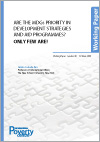
Are the MDGs Priority in Development Strategies and Aid Programmes? Only few are!
Resumo:The gap between strong political commitment to the Millennium Development Goals (MDGs) and slow progress towards meeting them is often attributed to weak “ownership” by developing country governments. This Working Paper addresses the issue of ownership by analysing the substance of 22 developing countries’ Poverty Reduction Strategy Papers (PRSPs) and the policy frameworks of 21 bilateral programmes. Two major findings of the analysis are as follows. First, economic growth for income poverty reduction and social sector investments (education, health and water) are important priorities in most of the PRSPs; decent work, hunger and nutrition, the environment and access to technology tend to be neglected. PRSPs also emphasise governance as an important means of achieving the MDGs, but they focus mostly on economic governance rather than on democratic (participatory and equitable) processes. Since the key motivation for the MDGs as reflected in the Millennium Declaration was to promote a more inclusive globalisation through participatory processes, the PRSPs are undercutting their core policy purpose. Implementation could be refocused if greater attention were paid to the neglected objectives and dimensions in the MDGs’ design, as major goals and with quantitative indicators. The single most effective revision could be to add a goal of reducing inequality in income and other dimensions of poverty within and between countries. Second, this Working Paper distinguishes between three functional uses of global goals: as consensus objectives, as monitoring benchmarks, and as planning targets. Most donor policy statements and PRSPs use MDGs as consensus objectives. Most PRSPs also use MDGs as planning targets, but without adapting them to local conditions and priorities. In most cases where MDG targets are set, they are in line with the MDG 2015 targets; this is not necessarily a sign of “ownership” because these targets are not accompanied by coherent action plans. If the MDGs are to be used as planning targets for resource allocation purposes, the international community could develop a more consistent and effective approach to the local incorporation of MDGs into national planning and priority setting. (...)